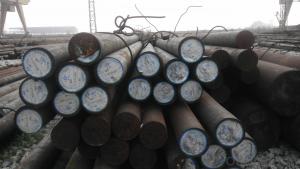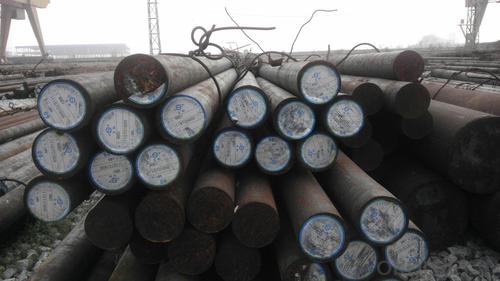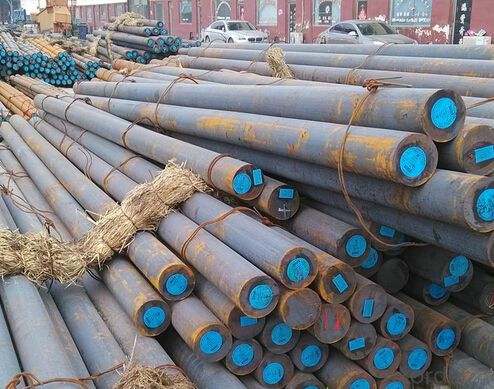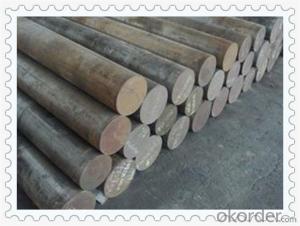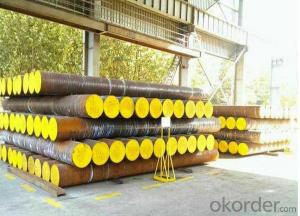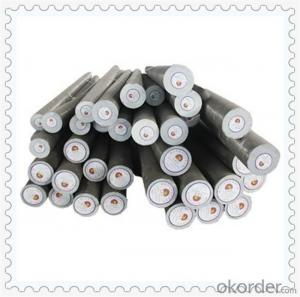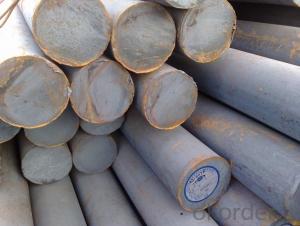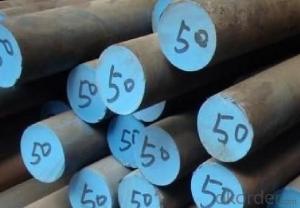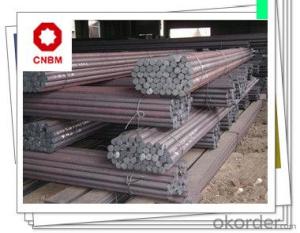Special Steel Hot Rolled SCM440 Material Round Bar
- Loading Port:
- China main port
- Payment Terms:
- TT OR LC
- Min Order Qty:
- 30 m.t.
- Supply Capability:
- 10000 m.t./month
OKorder Service Pledge
OKorder Financial Service
You Might Also Like
Specification
Chemical Element for JIS SCM440 round alloy steel bar
| Standard | Grade Number | |||||||||
| GB | 42CrMo | C | Si | Mn | P | S | Cr | Ni | Mo | Cu |
| ASTM | 4140 | 0.36-0.44 | 0.10-0.40 | 0.65-1.10 | ≤0.04 | ≤0.04 | 0.75-1.20 | - | 0.15-0.35 | ≤0.030 |
| DIN | 42CrMo4 1.7225 | 0.35-0.44 | 0.15-0.30 | 0.70-0.90 | ≤0.035 | ≤0.04 | 0.80-1.10 | - | 0.15-0.25 | ≤0.025 |
| JIS | SCM440 | 0.38-0.42 | 0.15-0.35 | 0.60-0.85 | ≤0.03 | ≤0.03 | 0.9-1.20 | ≤0.25 | 0.15-0.30 | ≤0.30 |
Physical Properties for JIS SCM440 round alloy steel bar
| Physical Properties | |||
| Tensile Strength (MPa) | ≥1080(110) | ||
| Yield strength(MPa) | ≥930(95) | ||
| Elongation(%) | ≥12 | ||
| Reduction of area(%) | ≥45 | ||
| Akv (J) | ≥63 | ||
| Impact roughness(J/cm2) | ≥78(8) | ||
| Hardness | ≤217HB | ||
| Specimen size | 25mm | ||
Surface Treatment: painting,plating,polishing,black oxide,transparent anti-rust oil
Heat treatment: Normalized / Annealed / Quenched / tempered
Product show
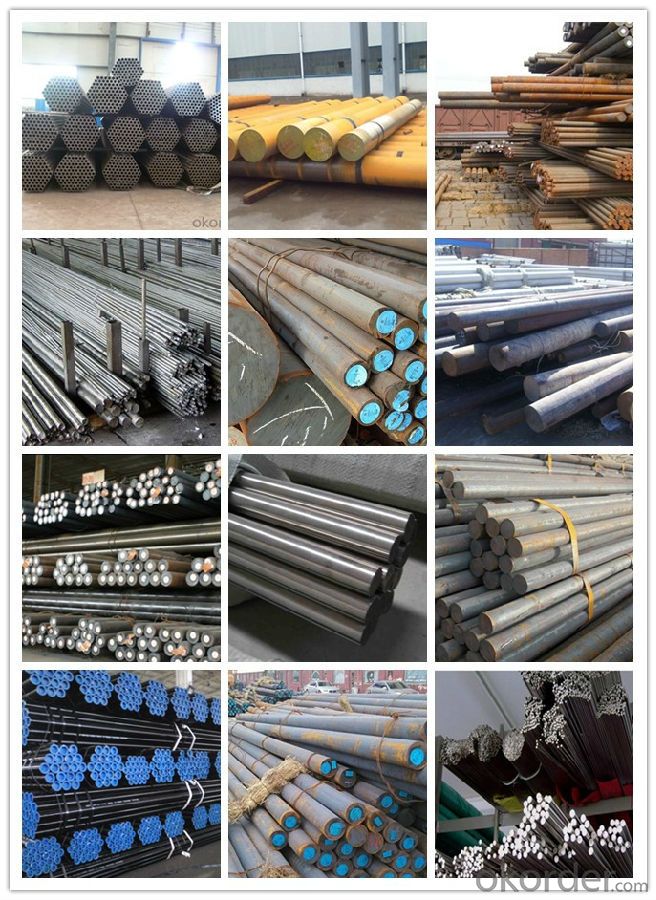
Workshop show
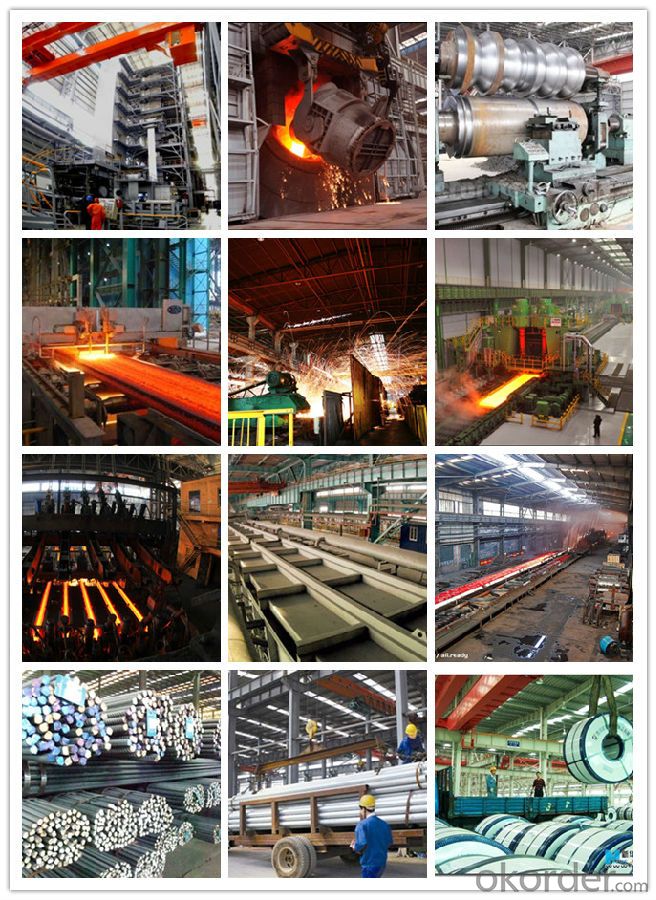
Shipping
1. FedEx/DHL/UPS/TNT for samples, Door-to-Door;
2. By Air or by Sea for batch goods, for FCL; Airport/ Port receiving;
3. Customers specifying freight forwarders or negotiable shipping methods!
Delivery Time: 3-7 days for samples; 5-25 days for batch goods.
Payment Terms
1.Payment: T/T, L/C, Western Union, MoneyGram,PayPal; 30% deposits; 70% balance before delivery.
2.MOQ: 1pcs
3.Warranty : 3 years
4.Package Informations: 1) EXPORT, In 20 feet (GW 25 ton) or 40 feet Container (GW 25 ton)
2)as customer's requirement
Main Product
Plastic Mould Steel
DIN 1.2311,1.2738,1.2083,1.2316 etc.
AISI P20,P20+Ni,420 etc.
JIS SUS420J2
Hot Work Steel
DIN 1.2344,1.2343,1.2367,1.2365,1.2581,1.2713 etc.
AISI H13,H11,H10,H21, etc.
JIS SKD61,SKD6,SKD5,SKT4 etc.
Cold Work Steel
DIN 1.2739, 1.2601, 1.2080, 1.2436, 1.2631, 1.263, 1.2510, 1.2327 etc.
AISI D2, D5, D3, D6, A8, A2, O1 etc.
JIS SKD10, SKD11, SKD1, SKS3 etc.
High Speed Steel
DIN 1.3343, 1.3243, 1.3247, 1.3355 etc.
AISI M2, M35, M42, T1 etc.
JIS SKH51, SKH35, SKH59, SKH2 etc.
Alloy Structural Steel
DIN 1.7035,1.6511,1.7220,1.7225 etc.
AISI 5140, 4340, 4135, 4140 etc.
JIS SCr440,SNCM439,SCM435,SCM440 etc.
Stainless & Carbon Steel or Others
DIN 1.4125,1.1191 etc
AISI 440C,1045, 1020 etc.
JIS SUS440C,S45C etc
Why choose us?
(1) The leading exporter in China special steel industry.
(2) Large stocks for various sizes, fast delivery date.
(3) Good business relationship with China famous factories.
(4) More than 7 years steel exporting experience.
(5) Good after-sales service guarantee.
- Q: How is case-hardening steel used in the production of gears and camshafts?
- Case-hardening steel is used in the production of gears and camshafts to enhance their surface hardness and wear resistance. The process involves heating the steel at a high temperature and then rapidly cooling it, creating a hardened outer layer while maintaining a tough core. This hard outer layer allows gears and camshafts to withstand the high stresses and wear they experience during operation, increasing their durability and lifespan.
- Q: How does special steel perform in high-stress environments?
- Special steel is designed specifically for high-stress environments, excelling in various forms of stress, including mechanical, thermal, and chemical stress. What sets it apart is its distinct composition and manufacturing process, resulting in exceptional resistance to stress. One of the standout features of special steel is its remarkable tensile strength. It can withstand immense pressure without deforming or failing. This strength is achieved by incorporating alloying elements like chromium, nickel, and molybdenum, which enhance its structural integrity and toughness. These elements also enhance the steel's resistance to corrosion and oxidation, ensuring its durability and reliability in harsh conditions. Additionally, special steel exhibits superb fatigue resistance, enabling it to endure repetitive and cyclic loading without developing cracks or fractures. This quality is crucial in high-stress environments where components are constantly subjected to vibrations or cyclic loading, such as in aerospace, automotive, and industrial applications. Not only does special steel possess impressive mechanical properties, but it also boasts exceptional resistance to extreme temperatures. It retains its strength and integrity even at elevated temperatures, making it suitable for use in high-temperature environments like power plants, furnaces, and chemical processing industries. Furthermore, special steel excels in wear resistance, enabling it to withstand abrasive conditions encountered in mining, construction, or manufacturing processes. This reduces the need for frequent maintenance or replacement, resulting in cost savings and increased productivity. In conclusion, special steel's outstanding performance in high-stress environments can be attributed to its unique combination of strength, durability, corrosion resistance, fatigue resistance, temperature resistance, and wear resistance. Its ability to withstand extreme conditions makes it the ideal choice for critical applications where reliability and safety are of utmost importance.
- Q: How is high-temperature tool steel used in the production of hot work tools?
- High-temperature tool steel is used in the production of hot work tools due to its excellent heat resistance and ability to maintain hardness at elevated temperatures. It is used to manufacture tools such as dies, molds, and punches that are subjected to extreme heat during processes like forging, extrusion, and die casting. The high-temperature tool steel retains its strength and hardness even at temperatures exceeding 1000°C, ensuring durability and prolonged tool life in demanding hot work applications.
- Q: What are the applications of special steel in the marine sector?
- Special steel is extensively used in the marine sector due to its unique properties. It is used in various applications such as shipbuilding, offshore platforms, and marine equipment manufacturing. Special steel provides excellent corrosion resistance, high strength, and durability, making it ideal for marine environments that are highly corrosive and subject to extreme conditions. It is used for constructing hulls, propeller shafts, pipelines, and various components of ships and offshore structures. Additionally, special steel's ability to withstand impact and fatigue makes it suitable for marine applications where safety and reliability are crucial.
- Q: Can special steel be used for making food processing equipment?
- Food processing equipment can indeed be made using special steel. Known as stainless steel, this type of steel is widely utilized in the food processing industry due to its distinctive characteristics. Stainless steel, being non-reactive, does not interact with food or change its taste, smell, or appearance. Furthermore, it is resistant to corrosion, a crucial feature in safeguarding against contamination and ensuring food safety. Additionally, special steel is long-lasting, easy to clean, and possesses a smooth surface that hinders bacterial growth. These attributes render it an excellent choice for producing food processing equipment such as mixing tanks, conveyors, cutting tools, and storage containers.
- Q: What are the different forms of special steel?
- There are several different forms of special steel, including stainless steel, tool steel, high-speed steel, and alloy steel.
- Q: How does special steel perform in additive manufacturing applications?
- Special steel performs well in additive manufacturing applications due to its high strength, durability, and resistance to wear and corrosion. The unique properties of special steel, such as its ability to withstand high temperatures and extreme environments, make it an ideal material for 3D printing processes. Additionally, the flexibility and customization offered by additive manufacturing allows for the creation of complex geometries and intricate designs, further enhancing the performance of special steel in various applications.
- Q: How does special steel contribute to the manufacturing of surgical instruments?
- Special steel, which is also known as stainless steel, plays a vital role in the production of surgical instruments. Its exceptional properties make it an ideal material for manufacturing high-quality surgical instruments used in various medical procedures. To begin with, special steel exhibits a high resistance to corrosion and rust. Surgical instruments are constantly exposed to bodily fluids, sterilization processes, and harsh cleaning agents. The corrosion resistance of special steel guarantees the durability of these instruments, enabling them to withstand repeated use and cleaning without compromising their integrity. Furthermore, special steel possesses excellent strength and hardness characteristics. Surgical instruments must be robust and capable of withstanding the forces and pressures exerted during surgeries. The high strength and hardness of special steel ensure that these instruments retain their shape and sharpness even after multiple uses, minimizing the risk of breakage or deformation during critical procedures. Moreover, special steel is biocompatible, meaning it does not elicit reactions or complications when in contact with bodily tissues or fluids. This is particularly important for surgical instruments that come into direct contact with patients' bodies. The biocompatibility of special steel guarantees that there are no adverse reactions or complications when these instruments are used in surgeries, thereby reducing the risk of infections or other complications. In addition, special steel is highly machinable and can be easily molded into intricate shapes and designs. Surgical instruments require precision and accuracy to effectively fulfill their intended functions. The machinability of special steel allows manufacturers to create complex instruments with fine details and features, ensuring their optimal performance during surgical procedures. Furthermore, special steel can be efficiently sterilized. Sterilization is a critical step in ensuring the safety and effectiveness of surgical instruments. Special steel's ability to withstand high temperatures and various sterilization methods, such as autoclaving or ethylene oxide gas sterilization, makes it an ideal choice of material for surgical instruments. In conclusion, special steel significantly contributes to the manufacturing of surgical instruments due to its corrosion resistance, strength, biocompatibility, machinability, and sterilization capabilities. These properties guarantee that surgical instruments made from special steel are durable, reliable, safe, and effective in medical procedures, ultimately enhancing the success of surgeries and improving patient outcomes.
- Q: How does special steel contribute to the mining machinery industry?
- Special steel plays a crucial role in the mining machinery industry by offering exceptional strength, durability, and resistance to wear and corrosion. This type of steel is specifically engineered to withstand the harsh and demanding conditions that are typically encountered in mining operations. In the mining machinery industry, equipment such as drills, excavators, loaders, crushers, and conveyor systems are subjected to extreme stress, heavy loads, and abrasive materials. Special steel components can be found in various parts of these machines, including buckets, tracks, cutting edges, gears, and hydraulic components. The high strength and toughness of special steel ensure that mining machinery can withstand the immense forces and impacts involved in excavation, hauling, and processing of minerals. This durability helps to extend the lifespan of the equipment, reducing the need for frequent replacements and minimizing downtime, which ultimately leads to cost savings for mining companies. Moreover, special steel's resistance to wear and corrosion is vital in the mining industry. The presence of abrasive materials and corrosive substances in the mining environment can lead to rapid deterioration of machinery components. However, special steel alloys are designed to resist wear and corrosion, thereby enhancing the longevity and performance of mining machinery. Additionally, special steel enables mining machinery to operate efficiently and effectively. Its high strength-to-weight ratio allows for the construction of lightweight yet robust equipment, improving mobility and productivity in mining operations. The use of special steel also enables the design of complex components with intricate shapes, ensuring optimal functionality and performance. Overall, special steel is an indispensable material in the mining machinery industry. Its exceptional strength, durability, resistance to wear and corrosion, and ability to enhance efficiency make it a vital component in the design and construction of mining equipment. By incorporating special steel, mining machinery can withstand the harsh conditions and heavy-duty tasks involved in mining operations, ultimately contributing to increased productivity, reduced costs, and improved safety in the industry.
- Q: How is special steel used in the aerospace sector?
- Special steel is extensively used in the aerospace sector due to its unique properties that make it suitable for various applications. One of the primary uses of special steel in the aerospace industry is for manufacturing aircraft engine components. These components, such as turbine blades, shafts, and casings, are subjected to extremely high temperatures, pressures, and stresses. Special steel, with its excellent heat resistance, high strength, and superior mechanical properties, enables these engine parts to withstand such harsh conditions, ensuring optimal performance and safety. Moreover, special steel is also utilized in the construction of aircraft structures, including wings, fuselage, landing gears, and other critical components. These structures need to be lightweight, yet strong enough to withstand the forces experienced during flight. Special steel alloys, such as stainless steel, are used to achieve this balance by providing excellent strength-to-weight ratios and corrosion resistance. Additionally, special steel finds application in aerospace fasteners, such as bolts, nuts, and screws. These fasteners must have exceptional strength and durability to ensure the structural integrity of the aircraft. Special steel alloys, like titanium alloys, are commonly used in this regard due to their lightweight nature, high strength, and resistance to corrosion. Furthermore, special steel is utilized in the production of aerospace tooling and equipment. These tools, such as molds, dies, jigs, and fixtures, need to be robust, wear-resistant, and capable of withstanding high temperatures and pressures during manufacturing processes. Special steel, with its excellent hardness, toughness, and heat resistance, makes it ideal for such applications. In summary, special steel plays a critical role in the aerospace sector by providing the necessary properties required for aircraft engine components, structures, fasteners, and tooling. Its unique characteristics of high strength, heat resistance, lightweight, and corrosion resistance make it an indispensable material in the production of reliable and high-performance aerospace systems.
Send your message to us
Special Steel Hot Rolled SCM440 Material Round Bar
- Loading Port:
- China main port
- Payment Terms:
- TT OR LC
- Min Order Qty:
- 30 m.t.
- Supply Capability:
- 10000 m.t./month
OKorder Service Pledge
OKorder Financial Service
Similar products
Hot products
Hot Searches
Related keywords
